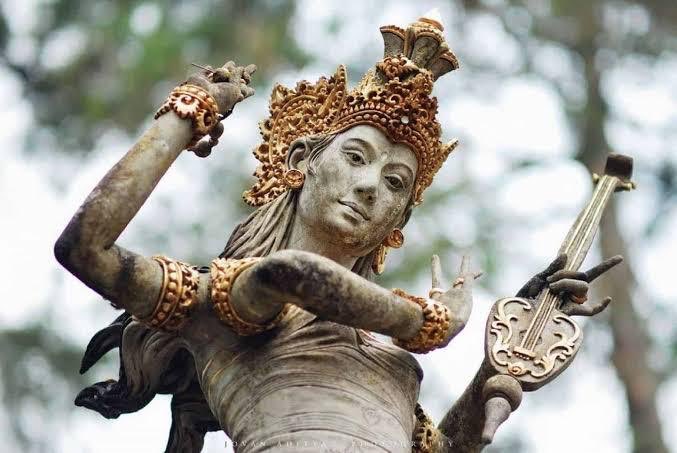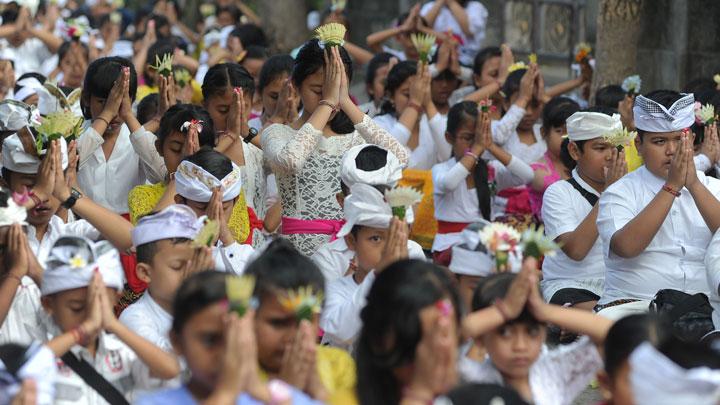Balinese Hindu celebrate many aspects of life in a spiritual way. One of the most significant is Saraswati Day. This sacred occasion holds profound importance, especially for those in the field of education, such as students, teachers, lecturers, and other knowledge workers. Dedicated to the Hindu Goddess of Wisdom, Saraswati day symbolizes the descent of sacred knowledge, bringing prosperity, progress, and enlightenment to humanity. Read more as we delve deeper into the significance behind this grand celebration.
Honoring Knowledge and Wisdom: The Significance of Saraswati Day in Bali
In Honor of Knowledge Goddess

Saraswati Day is celebrated every six months on Saniscara (Saturday) Umanis Wuku Watugunung, according to the Balinese Pawukon calendar. On this day, Balinese Hindus perform special ceremonies and rituals to honor the Goddess Saraswati. In schools, teachers and students prepare for worship ceremonies, offering prayers in temples, homes, and offices. Books, palm leaf manuscripts, and writing tools are placed in special locations for ceremonial offerings, symbolizing respect and devotion to the Goddess of Knowledge.
The Bestower of Wisdom

In Hindu legend, Saraswati is depicted as the Goddess and consort of Lord Brahma. She is revered as the protector and bestower of knowledge, consciousness (widya), and literature. Through her blessings, humans become knowledgeable, cultured, and civilized. Saraswati is often portrayed sitting on a lotus flower, riding a swan (hamsa) or peacock, with four arms holding a sitar or veena and a gayatri in her right hands, while her left hands hold a manuscript or book and play the veena.
A Full Day of Prayer

On Saraswati Day, worship of Goddess Saraswati is performed only in the morning and afternoon, according to the Sundarigama manuscript. After ceremonies in schools, devotees continue their prayers in various places, emphasizing the importance of knowledge in daily life as a moral and spiritual foundation.
Banyupinaruh: Continuing the Celebration

The Saraswati Day celebration extends into Banyupinaruh, which falls on the following Sunday during the wuku Sinta. Banyupinaruh marks the beginning of a new pawukon cycle in the Balinese calendar. On this day, Balinese Hindus seek water sources such as the sea, campuhan (the confluence of fresh and seawater), or other water sources to perform Pengelukatan (melukat), a ritual involving cleansing oneself with water, symbolizing the purification of the soul through knowledge.
The All-Knowing 'Gecko'

A unique aspect of Saraswati Day offerings is the rice effigy (Sanganan) shaped like two geckos (male and female), known locally as 'cicak.' The gecko is the traditional symbol of Saraswati, believed to possess spiritual sensitivity and the ability to listen to people's secrets, akin to a 'fly on the wall.' This symbolism highlights the all-knowing nature of the Goddess of Knowledge.
A Dedicated 'Pura' Temple

In Ubud, the cultural heart of Bali, stands the Pura Taman Saraswati temple, dedicated to the Goddess of Wisdom. This temple, with its beautiful architecture and serene lotus pond, embodies the essence of Saraswati and attracts numerous visitors seeking spiritual enlightenment and cultural immersion.

Until this modern era, Saraswati Day still became Balinese Hindu's deep reverence for knowledge and wisdom. Through ceremonies, rituals, and symbolic offerings, this sacred occasion underscores the importance of education and the pursuit of enlightenment, fostering a harmonious and civilized society. Whether through traditional symbols or modern representations, the celebration of Saraswati Day continues to inspire and enrich the lives of the Balinese people, making it a truly remarkable cultural event.




 Billy Bagus
Billy Bagus
 Jul 19, 2024
Jul 19, 2024






